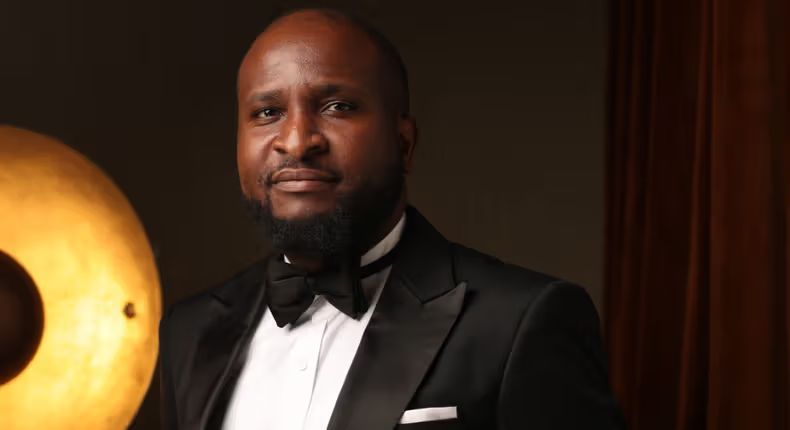Moses Babatope talks about his experience becoming a powerhouse in the film business and his next big project.
After mounting rumours of infighting in the top management of FilmHouse Group, the parent company of Filmhouse, co-founder, Moses Babatope, in March 2024 announced that he was leaving the company.
But the film executive won’t allow the exit from the company he started with Kene Okwuosa in 2012 to be the closing chapter of his Nigerian entertainment and media distribution operator career.
In April 2024, he announced he was back in the ring, with plans to launch his own entertainment and media brand.
In an interview with Pulse Nigeria, Babatope didn’t hold back – except of course when it came to what happened in his final days at FilmHouse Group – on his career, starting from his days as a cashier to his rise to the top of Nollywood’s distribution food chain.
This interview has been edited for length and clarity.
Let’s talk about how you came into the career. How did this all start?
I was quite fortunate with the way I made it. My aunt, whom I lived with in England, said there was a vacancy where I could find part-time work because I was studying then. I got into the film industry as a cinema staff, the lowest level, back in October 2002.
The cinema I worked for then was called Odeon Cinemas in Surrey Quays, Southeast London. I went for something like an open day, that’s how it was done then and I was fortunate enough to meet my co-founder of Filmhouse Group. He was supervising that process, and one of the activities was for us to do a role-play of an emergency. You had to speak to an auditorium full of people to exit the building in the event of an emergency, which I was terrible at communicating.
I was about to walk myself out and my co-founder (we were teenagers then), called me back and said I should do better next time. That’s how the journey in the industry began. I became a cashier. I grew to become a team leader, a cinema manager, and a special project manager before coming to Nigeria with my co-founder.
When you think about your career, over two decades in the industry, what comes to mind?
I grew up in a very conservative home as a Deeper Life boy. We hardly watched TV. So for me, the concept of seeing people watching images on the big screen, having fun, and making money out of all of that was very tricky. But that was where the desire and the dream to have cinemas of my own or cinemas that I could partner with in Nigeria got ignited.
One of the high points of my career was starting the job at Odeon Cinema and seeing that this is a proper business where people can come and watch a film, buy popcorn, drink and have fun. I barely watched TV at home, and now being exposed to this world, where people are enjoying stuff on the big screen. It was a high moment.
I was able to find like minds to say, “This is very interesting, being able to show people films and see people have fun and getting paid for showing people. We can do this in Nigeria.”
So what did we do? We started by showing Nigerian films, you know, late nights on Friday and Saturday in our cinemas because we knew that those nights they barely had anything to show on those screens.
We partnered with promoters and joined promoters in the UK. Then we partnered with influencers or opinion leaders, people who were leaders in the communities. Then we got people to bring films from Nigeria and they’ll do a premiere.
Another highlight was working with Ayo Makun on his next film after 30 days in Atlanta — we made his next four, or five films. Working on Sugar Rush with Jade Osiberu. That was where I believe Kayode Kasum had his cinema debut.
Launching the film fund, the first ever West African Film fund with a million dollars, where we raised money from Huahua Media in China and Advance Team in South Africa. Releasing Wedding Party 2 in over 20 countries. Winning several awards including the Highest-Grossing Distributor in Africa and Highest-Grossing Exhibitor in Africa are highlights.
So, what’s this new media venture, it says entertainment and film distribution. What will it look like?
We tend to play in the spaces of cinema exhibition, film distribution, film or content production, and entertainment technology in a significant manner. We tend to play in the space both locally and internationally, so, we’re not going to be bystanders. We’re not going to be observers. We’re going to be real market participants, where the intention is to demonstrate to investors and enthusiasts that we want to create a significant role in the next frontier or the next evolution that nobody is about to undertake.
You said in the press release announcing your new venture that “the plan is to grow the industry ten times bigger?” How will you do that?
We’re coming with the benefits of experience, relationships, and the lessons we’ve learnt. We’re also coming in with integrity. We’re coming in to say “You can stake a claim on us, this is what we’ve done.”
We are saying that based on what we’ve done when we were challenged and when we needed to prove a point, look at the results. There’s no reason for you not to have faith and belief in us.
In the conversations we are having so far, people are convinced. People are like “Okay that’s true. You have done this with next to nothing. We want to support you with something.” That’s where the confidence of a ten times impact is coming from.

